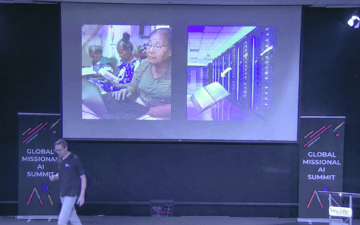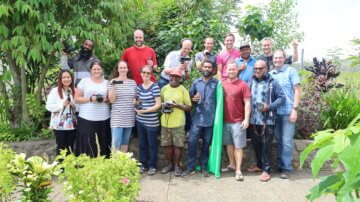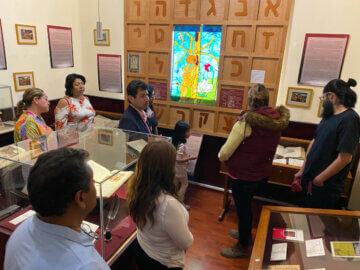AI Summit highlights what is coming soon ... and what is here now
In his keynote address at the recent Global Missional AI Summit, SIL data scientist Dan Whitenack showed a photo familiar to anyone who has ever been around Bible translation: a translator at a project site working on a laptop, using Paratext.

Dan Whitenack during his keynote presentation, showing what AI-assisted Bible translation will NOT look like.
Then he showed a picture representing fears of how artificial intelligence will change Bible translation. The photo showed a room full of supercomputers, no humans in sight. This, he said, does not represent the future of Bible translation aided by AI.
“It will not be a computer popping out a Bible,” Whitenack said. “It will look more like this.”
And he showed the original picture again — “A Bible translator doing Bible translation with new, advanced tools that come along beside translators and consultants and help them.”
Big themes
The summit, held 12-14 April at Wycliffe USA in Orlando, Florida, brought together Christians working on the future of AI as it relates to the global church. Sponsors included SIL, Every Tribe Every Nation‘s Innovation Lab, Biblica, American Bible Society, Global Media Outreach and Christian Vision Global.
During a week when it was easy to get lost among futuristic thinking, tech jargon and Star Wars references, these were some recurring themes:
- AI could drastically reduce the time needed to translate a high-quality Bible — maybe by more than half. It could serve as a valuable assistant before, during and after language projects. It could allow translators to see past their own cultural contexts in translating Scripture. AI also could benefit the church with well-designed Scripture engagement tools stocked with incredible amounts of data, offering vast resources in many languages.
- AI also could cause deep spiritual damage, leaving thousands of languages behind and enabling poorly designed Scripture engagement tools, which could leave Christians lazy and confused with mangled theology. Kind of like a library with no librarians and with all of the books on the floor.
- Christians need to be involved in developing AI platforms and their underlying ethics. If we are not, these systems could be inherently biased against a biblical view of the world.
A reliable guide

Elizabeth Robar
Elizabeth Robar, founder and director of Cambridge Digital Bible Research, sees AI’s potential to be a reliable guide, pointing translators and consultants to the most-useful resources, quickly. The ideal tool, she said, will be “fully aware of a translation team’s workflow and available resources.” For example, it would know which resources translators commonly consult after drafting. It would be aware of other teams’ related work. And it could make recommendations on how to modify workflow for greater efficiency.
“During drafting, the ideal system would be able to look over the shoulder of a translator and provide prompts for necessary decisions,” she said. For instance, it could ask questions during the lookup and checking processes.
“If we have an analysis of a text, say, the message of a Psalm, is that message being drawn out?” she said. “These are the emotions that should happen. Do you see that happening in your text? In some ways, this is having a virtual translation consultant.”
But always, she emphasised, the technology serves the human translation team – not the other way around. In fact, AI could be built right into a future version of Paratext, which then would serve as the central source that links all of those resources.
More ways AI can help

Dan Whitenack
SIL’s Whitenack mentioned more things AI will be able to do.
- Help optimise the order in which books and verses are translated. Rather than simply beginning with chapter 1, verse 1 of a book, for instance, a “golden path” emerges as key words and phrases are translated. With each subsequent verse and chapter, AI assistance will get better.
- Give suggestions. As the user is typing and working in a certain verse, they get a pop-up suggestion for translation or reference, based on previous work. This is similar to what Microsoft Word or Google already do, but optimised for Bible translators and embedded in Paratext.
- Better, faster lookup systems. Whitenack likes the term “copilot” because “it implies that there’s a pilot. There’s still a human at the (controls).”
“Translators are good at translating,” he said. “They do this all day long. … But then they get to a point of, What is an ephod? And then it’s just a blocker. They have to stop and search through maybe 17 panes of different resources. So we want a better lookup system for that.”
For instance: a translator could ask: “Why didn’t Jonah want to go to Ninevah?” A copilot system under development gives an accurate answer and citation—in this case, the Tyndale Study Notes. Developers envision a near future when AI can translate resources like this into many languages. - Pairing existing quality assessment methods with AI. “Radiologists are already being paired with image analyzers to help analyse medical imagery and make diagnoses,” he said. “We should be able to do a parallel thing with AI pair reviewers, where we are able to pick apart a draft and understand various qualities about that draft, missing or added information, clarity or naturalness issues.”
- Digital publishing and Scripture engagement in many languages simultaneously on websites and social media pages. SIL is working on a chat platform called M2, in which an organisation could add numerous languages to the same bot (which “chats” with the user — like many retail or travel websites do).
“This is a foundation for interacting with many different language communities without the operational burden of having to clone 33 bots, connect all the data analytics together, copy all the rules over, manage all the translations,” Whitenack said. “All of that is taken care of here. So you can quickly create a bot that you can run on 33 different Facebook pages, engaging people in 33 languages.”
Story: Jim Killam, Wycliffe Global Alliance
More about SIL’s AI work
MORE
- “A Sputnik moment”: The release of ChatGPT represents ”a Sputnik moment” for technology — and an opportunity the church should not miss, an expert says.
- AI tools, and challenges, for discipleship: A digital theology consultant explores how generative AI could help, or hinder, Scripture engagement.
The latest
View all articles
03/2024 Pacific: Papua New Guinea
Informing, teaching, inspiring: PNG workshop teaches video storytelling for language communities
PNG workshop teaches video storytelling for language communities
Read more
02/2024 Global
Looking ahead at 2024
As the year unfolds, we marvel at the work of God in our rapidly changing world. And, we look forward to a number of gatherings and conversations intended to draw us together.
Read more
01/2024 Americas
Telling the Bible's Story
It may come as a surprise that a museum is among the Wycliffe Global Alliance organisations.
Read more